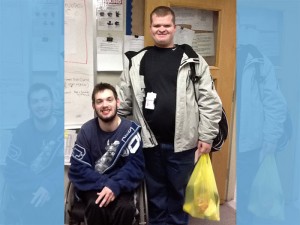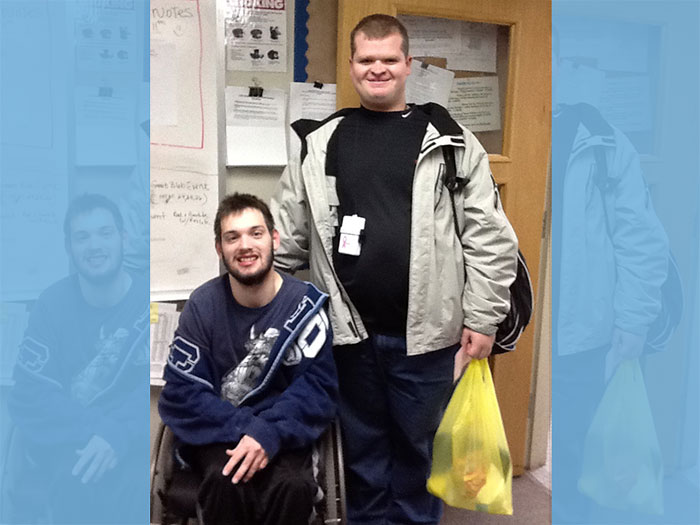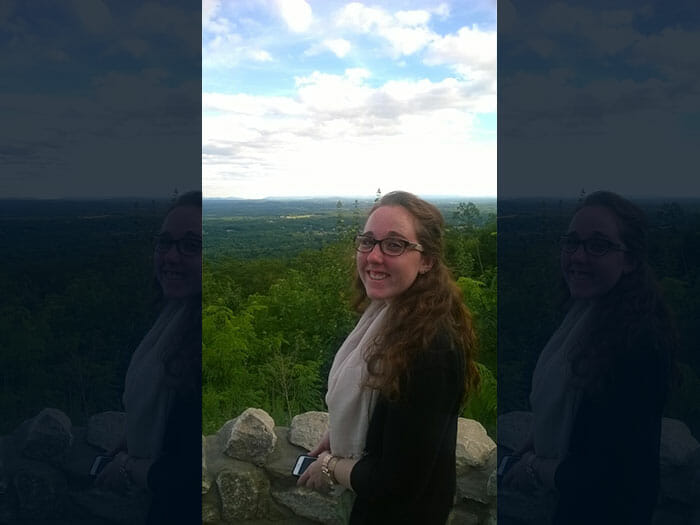
Paul Scherzinger (left) and Christopher Siani are students in the AHRC Melissa Riggio Higher Education Program at CSI.
The Melissa Riggio Higher Education Program (MRHEP) ensures that students with intellectual disabilities (ID) are granted the opportunity to prepare for adult life through higher education coursework, career exploration and preparation, the development of self-efficacy and opportunities to build social relationships. The program was established in August 2008.
Over the course of three years, students who are a part of the Melissa Riggio Program at CSI spend five days-a-week attending classes, and participating in internships, all in the pursuit of carving a career path and creating a full life.
The students receive support while on campus through student mentors. The mentors may assist the MRHEP students with homework and note taking in class, attend clubs and Clue Events, hang out in the cafeteria, etc.
Mike Prindle, a CSI Alumnus who now works for the MRHEP full-time as a Higher Education Support Professional says, “It’s been a great experience working for the program. “They’re always happy to see me—it’s like being a teacher but much more personal.”
The idea behind this program is to ensure that the 15 students that are a part of the program at any given time has the opportunity to become a “full citizen.” Matthew Weiler, the Program Director of the MRHEP, explains that “A full citizen is someone who is employed, has a strong social circle, is politically active, and is a member of the community in every way.” He, along with the members of the staff, believes that attending college is one of the most effective ways of building full citizens.
The path is not easy.
There is a rigorous application process that begins when the parents or high school teachers of a student reaches out to the program and submits an application. The MRHEP staff evaluates the applications and recommendations.
Students then attend orientation along with their family, the idea being that, as Mr. Weiler puts it, “everyone—staff, student, and family—must share in this singular vision.” The student and parents are then interviewed separately to insure that the student and families expectations are in alignment with the vision of the program.
Finally, each student is given a project that tasks them with describing their dreams for the future, hobbies and job expectations. They attend a two day trial that includes them sitting in on supplemental courses where their level of engagement and motivation is measured. Then, and only then, does the committee pick the four or five students each year that are accepted into the program.
The seriousness of the selection process illustrates just how much of a difference becoming a part of the MRHEP can make for these students.
For example, two former students have returned to campus in order to take their General Education Diplomas (GEDs) through CSI’s Continuing Education Program.
Students who have graduated now have jobs at the Council for the Arts, at Barnes and Noble and The Wagner College Bookstore, to name a few. One former student now teaches English to elderly Chinese people.
Mr. Weiler gave an honest assessment of the possible career paths his students can take.“Maybe a student has aspirations of becoming a doctor,” he explained. “We help guide them toward a career path that may be more realistic, so, after three years that same student can earn a job working in a doctor’s office—the idea is we personalize each and every piece of curriculum to fit the needs and goals of each of our students.” The AHRC Melissa Riggio Higher Education Program primary goal is employment upon graduation.
As much as the MRHEP does for its students, they also make sure to give back to the campus any way they can. The staff is composed of CSI Alumni who work there full time or CSI interns earning credits as mentors. They are also sure to take part in several of the events on campus, both as a way of giving back and so the program’s students can participate in the campus atmosphere. Additionally, on an annual basis, CSI student mentors can compete for a $1,000, Melissa Riggio Higher Education Scholarship. This is funded through the Association for the Help of Retarded Children (AHRC) Foundation.
Danielle Pompili, Community Support Supervisor, put it best: “it isn’t about being a guest; it is about being a partner.” She went on to explain that “everybody has the right to experience college and expand his or her world.”
For their part, the students are sure not to take the MRHEP for granted.
Paul Scherzinger, with the program since 2011, declared that he “always wanted to go to college and joined the program to “better myself.”
Christopher Siani, completing his first year with the program plans on volunteering at a nursing home and is excited to continue to “learn new things.”
When asked what the best part of attending CSI was, Siani answered, “It’s all the best.”





![[gallery] Dr. Michael Kress Honored at Symposium](https://csitoday.com/wp-content/uploads/2016/05/Kress-Subha-Abdallah.jpg)











